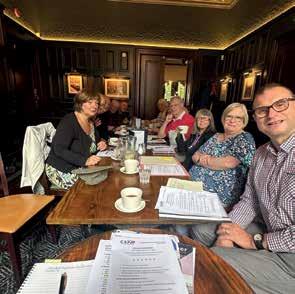Are grandchildren good for your health?
THE MAGAZINE FOR MEMBERS OF THE CIVIL SERVICE PENSIONERS’ ALLIANCE
Housing crisis: campaigning for more and better homes
AGM 2024: special supplement setting out this year’s agenda


Are grandchildren good for your health?
THE MAGAZINE FOR MEMBERS OF THE CIVIL SERVICE PENSIONERS’ ALLIANCE
Housing crisis: campaigning for more and better homes
AGM 2024: special supplement setting out this year’s agenda

Stay one step ahead of the fraudsters

Winter fuel payments, which have in recent years been paid to all pensioners tax-free, are to be restricted to those on Pension Credit and certain other benefits only this year.
The government announced the change in order to address funding shortfalls, which it said had been left by the previous administration.
CSPA General Secretary Sally Tsoukaris said: “Whilst energy bills have reduced since their peaks in 2021 and 2022, our members and others are finding that prices have remained relatively much
“We call upon the government to widen the net significantly”
higher than they were just a few years ago. We know only too well that far too many pensioners who are eligible to receive Pension Credit payments, and other benefits, are simply not applying for them for a host of reasons, with estimates of the numbers in this category being in the hundreds of thousands.
“We call upon the government to widen the net significantly to ensure that all those who need additional support to be able to heat their homes this winter can benefit from winter fuel payments and not be forced to choose between heating and eating.”
In November 2023, an additional pensioner cost of living payment of £300 was paid with the winter fuel allowance, but it is very unlikely to be applied again this year. Regulator
A delegation including Liverpool MP Ian Byrne and former Australian judge Jocelynne Scutt moved quickly after the election to increase pressure on Sir Keir Starmer over women born in the 1950s, David Hencke writes They called for mediation to end the stalemate in paying out compensation to those who waited six years to get their pensions.
As well as presenting a letter and a petition signed by 36,000 50s women, they appealed to new work and pension secretary Liz Kendall to open talks to sort out the longstanding issue – neglected by both Tories and Labour during the general election.
Tory ministers and Labour shadow ministers kept insisting they needed more time to study the report by the
recently knighted former Parliamentary Ombudsman Sir Rob Behrens, which found partial maladministration over communications to the 3.3 million women, who faced a six-year delay until they reached 66 to get a pension. He recommended up to £2,900 be paid to each to cover maladministration.
The pensions equality campaigning group CEDAWinLAW decided this was not enough as it did not cover past discrimination against women, many of whom had faced hurdles preventing them qualifying for a full pension.
They have insisted that since the UK signed the UN Convention on Eliminating All Forms of Discrimination against Women in 1986, such paltry compensation breaks international law.
Later, Jocelynne Scutt, whose report
Ofgem announced earlier this year that the regulated energy price cap was to reduce to £1,690 from 1 April, down from its peak of more than £4,000.
To check whether you, or someone you care about, may be eligible for Pension Credit, a free TV licence or any other benefits, we recommend the help and advice available from our partners at Independent Age (www.independentage. org/get-advice/money/benefits/ pension-credit or telephone 0800 319 6789) and Age UK (www.ageuk.org.uk/ information-advice/money-legal/benefitsentitlements/pension-credit/ or telephone 0800 678 1602).
Age UK has also started a petition to save the winter fuel payment for struggling pensioners. Please visit www.ageuk.org.uk to sign the petition.

highlighted discrimination against the women, made a strong speech saying it was time for a new government to open talks and settle this dispute.
She praised Chancellor Rachel Reeves for planning to implement a key recommendation promising to implement part of the Equality Act that would gain equal pay for women and men. Future generations would at least earn higher pensions as a result, she said, ending the gap in the private sector for men and women.
Chancellor Rachel Reeves has announced a comprehensive pensions review aimed at improving the financial provision for pensioners and driving economic growth.
The review aims to help channel billions from defined contribution pension schemes into the UK economy, in a move the Treasury says could increase individual pension pots by more than £11,000.

way to reform planning, create a National Wealth Fund and improve stock exchange listings. The review will be led by the first joint Treasury and Department for Work and Pensions Minister, Emma Reynolds. The initial phase will focus on increasing investment and pension outcomes. The next phase will further address retirement adequacy and market investments.

There’s never a dull moment in our busy head office, and we are pleased the colleagues who joined us in the latter half of last year have settled in very well.
The review will explore using the £360 billion in the Local Government Pension Scheme for more productive investments and reducing the £2 billion a year spent on fees.
The announcement preceded the first meeting of the Growth Mission Board, with measures already under
The move could increase pension pots by more than £11,000
The Chancellor and the Pensions Minister will engage with industry leaders to shape the review. Supportive responses from industry figures highlight the anticipated positive impact on economic growth and pension savers. And legislative moves, such as the Pensions Bill’s value for money framework, aim to enhance governance and returns for pension savers.
Overall, the review aims to ensure better retirement outcomes and to harness the significant potential of the pensions industry to support national growth.


In the CSPA annual report, distributed with the Summer edition of The Pensioner, there were a couple of inaccuracies unfortunately. We would like to make clear that Brian Sturtevant, CSPA President, should have been listed as such on the Who’s Who pages. Also, in the National Pensioners Convention report, it should have been stated that Brian represented the CSPA on the Pensions and Incomes Working Party (PIWP) along with the CSPA’s Chris Haswell. Brian chairs the PIWP and wrote the report of the Convention for The Pensioner.
Marion McAuliffe (pictured), who was promoted to Office Manager in July 2022, has taken partial retirement by reducing her working arrangements to two days a week. Marion retains a key role in our team as Finance and AGM Manager, and she is still responsible for all matters relating to membership subscriptions and the administration of our AGM event.
We are pleased to welcome Lorraine Lydon as our part-time Office Manager. She is working with Marion to look after our office systems and administrative functions, as well as helping to publish and distribute our group newsletters.
Marion McAuliffe has now become our Finance and AGM Manager
The landlords of our Croydon HQ notified us in April of their intention to give up the premises. We will therefore be relocating to an alternative location in early November. We have looked at a number of places and we will keep members updated about our new home. Any changes to our contact details will be kept to a minimum to avoid any inconvenience.
Abig hello to you all. What a momentous summer we’ve had – from the era-defining general election to the ecstasy and agony of UEFA football and the splendour of the Olympic Games in Paris. Whatever you were watching or doing, we hope you had good times to remember as the nights draw in and the leaves start to fall.
Believe it or not, 2024 marks the 10th anniversary of Later Life Ambitions (LLA). We hope to host another parliamentary event in the coming months to celebrate this, and plan to use any opportunities to remind those in government, as well as those on the opposition benches, of the importance of our campaigns.
Before the election, we spent over a year working with our LLA colleagues NFOP and NARPO to ensure election candidates were aware of CSPA priorities and our LLA manifesto Standing Up for Pensioners. And we held a parliamentary event last November, followed by several
Believe it or not, 2024 marks the 10th anniversary of Later Life Ambitions

meetings with MPs, ministers and other decision-makers.
Since the election, we have sent letters of congratulation to new ministers, with the aim of cementing existing working relationships or to introduce ourselves. And we have ongoing dialogue with several new MPs who indicated an interest in our manifesto pre-election.
From speaking to CSPA members round the UK, it is abundantly clear to me that the rising burden of tax on pensions income is a pressing concern, and we are calling on the government to review the frozen tax threshold to mitigate the impact of fiscal drag on older people.
The Institute of Fiscal Studies has recognised older people are the demographic worst affected by having to pay tax on more and more of their income,
We are pleased to welcome Jonathan Freeman as the new CEO of the Charity for Civil Servants. We work closely with the charity in many ways, to mutual benefit, and have enjoyed collaborating with former CEO Graham Cooper for many years. We wish him well in his retirement.
Our recent affiliation with the Care and Support Alliance (CSA) has yielded fruitful opportunities to campaign nationally for improvements to our social care
systems and support offered to carers. The CSPA was one of 54 organisations signing an open letter from the CSA to the incoming government. The letter was also signed by 24,000 people. As a result, it was profiled by Sky News, the BBC’s Today programme, BBC Breakfast and the One o’Clock News
We have promoted the CSA’s Show Us You Care online campaign to our members to help them find out what is good, and what is not so good, about the provision of care in their local area.
from the state or civil service pension and any other occupational pension schemes they’ve paid into.

We are pleased to have played our part in promoting this campaign to the National Pensioners Convention biennale conference in March, to ensure the voices of hundreds of thousands more pensioners echo our demands.
We were pleased to see the three main parties all commit to maintaining the triple-lock throughout the first Parliament before the election, and we will keep up pressure on the new government to make sure their pledges are honoured.
While we must be realistic about the economic pressures the country is facing, and sensitive to the concerns of the generations behind us who believe that the state pension won’t be there for them, we must stand firm in defending everyone’s right to a decent standard of living in later life.
At the same time, we will continue to push back against calls for the raising of the state pension age to be brought forward – 68 is indeed ‘too late’, never mind suggestions that it be increased to 70, or even 80 as one former prime minister has suggested!
We encourage CSPA members to urge their MP and local authority to bring about improvements in social care and support for carers locally.
Meanwhile, our partnership with Age UK has helped it secure a group of MPs willing to speak up for older people’s interests, after more than 33,000 emails were sent to 3,341 election candidates – 500 vowed to be Age Champions if elected.
The examples given here – two of many – highlight people’s power to make a difference and the value of the CSPA teaming up with the right partners to extend our influence.
Our Annual General Meeting on 9-10 October is approaching rapidly, and groups and branches have played their part in drawing our attention to a range of issues of concern to members.
We have received more than 50 motions for debate on topics ranging from pensions to health and social care, public transport and pensioner taxation. We look forward to lively discussions.
We have several proposed constitutional amendments to consider this year, relating to recruiting new members and supporting active local groups in England and Wales, as well as the branches in Northern Ireland and Scotland.
We must also stay in touch with the growing number of members who are not part of open groups. Sadly, this has led to some calling for greater separation within our CSPA ‘ranks’ to address issues that this lack of member engagement in England and Wales poses for our democratic structures. I remain hopeful that our belief in the campaigning strength of unity will win out.
The number of members joining online is significantly up on recent years. But we have much more work to do to ensure the CSPA’s future success is secured.
All members can play their part in letting people they know about the valuable work we do. Please encourage friends and former colleagues to join us.
We invite all members to consider becoming more actively involved if they are not already participating in their local group or branch – they can be assured of
a warm welcome, ongoing comradeship, sociable gatherings and a chance to make a real difference to our campaigns. This year’s AGM will update members on progress made, as well as exploring the concerns raised.
The Labour Party pledged to urgently address the woeful state of our social care system, and we will keep up the pressure on government to face up to the dire need for a properly funded, national social care framework.
They must also consider the need to alleviate problems being experienced by NHS services and the critical importance of providing more effective ways for people to access community-based care. AGM motions look at how the CSPA
We have received more than 50 motions for debate this year

might best use its influence to effect positive change in these critical areas.
Many older people continue to be negatively impacted in accessing vital services by not having access to the internet. Our AGM will urge the Executive Council to maintain pressure on the government to compel those providing local authority services and utilities and large companies to make services accessible for those without online access. Another motion asks the EC to seek assurances that nobody will be left without access to phone services in the switchover to digital.
The AGM will again address the decline of local and rural bus services and remind us to support the National Pensioners Convention’s National Bus Week campaign for improved services.
We will also consider a motion asking the CSPA to campaign for more consistent concessionary fares for pensioners across all transport networks, and another that raises concerns about the dangers of ‘floating bus stops’.
Finally, I have long written about our campaign to appoint a Commissioner for Older People and Ageing in England and Scotland, supported by Independent Age, Age UK and the National Pensioners Convention. The AGM will remind us to continue this work.
• For details on all our AGM motions, see the supplement with this issue.
Individual members have always been able to attend our AGM but in the past have had to meet all their own costs. As the AGM is a residential event, these costs are not insignificant.
The CSPA Executive Council recognises that many of our members are no longer covered by active groups and branches that can send delegates to the AGM
and have offered the opportunity for a limited number of members to attend at a subsidised rate of £70 for an ensuite room on the Wednesday night. This includes all meals and accommodation for a single guest.
Travel costs are not included, but there is a free shuttle bus service from Coventry station to the venue at
Chesford Grange Hotel in Kenilworth, which can be made available.
Any member not covered by a group or branch who is interested in attending the AGM should contact us on 020 8688 8418 or email enquiries@cspa.co.uk . There is limited availability, but those who attend will be able to participate fully. We look forward to seeing you.

We’re seen as easy prey. Cybercriminals smell weakness, a lack of computer savvy and therefore easy cash. Anyone in their 60s or older is disproportionately affected by scams, whether by phone calls and messages or through email. The average age of an email scam victim is 74.
People especially at risk are those who are isolated or lonely, or living with dementia or cognitive decline. These fraudsters take no prisoners.
The vast majority of us who have smartphones and computers attract the attentions of scammers. Some 73% of UK adults (40 million) have been targeted and 35% (19 million) have lost money because of it.
The average amount lost by victims is £1,730, according to National Trading Standards. But estimates of the proportion of victims reporting scams vary from about a third to as little as 5%.
And beware. Someone who has been successfully conned is often targeted repeatedly and added to so-called ‘suckers lists’ shared between scammers.
Deep concern about the growing menace of computer fraud was expressed at the CSPA’s AGM in March. Pensioners are seen as lucrative targets. Following reforms in April 2015 allowing people to access their savings from the age of 55, there has been a surge in pensions fraud.
Basically, scammers are out to get their hands on your nest egg. Either the money will be switched to a dodgy investment scheme or it will simply disappear into their pockets. Don’t let them do it.
The Financial Conduct Authority warns: “If you get a call out of the blue (a cold call) about your pension, the safest thing to do is hang up. It’s illegal and probably a scam. If you get offers via email or text, you should simply ignore them.”
If you have time, the authority asks you to report these sort of approaches to the Information Commissioner’s Office.
One way of avoiding being taken in by fraud via your phone is by refusing to answer calls from an unknown number. If the call is legitimate, the person or
The FCA says: if you get a call out of the blue about your pension, hang up
Scammers have a million and one ways to get at your money. Barrie Clement outlines how you can spot the fraudsters
company will probably leave a message. Thieves tend not to do that.
Watch out for calls supposedly from your bank. Scammers might ask for your PIN and tell you to give your bank card to a courier. Your bank would never do this.
Or a supposed technician may contact you claiming your device has a virus and you need to download software to fix it.
This is actually spyware giving scammers access to all your online information.
Calls claiming to be about correcting your council tax band or giving you a rebate are fake. Your council would never call you on such a subject out of the blue.
Another way thieves seek to help themselves to your hard-earned cash is
through investment scams. Again, you will be contacted out of the blue and offered opportunities that seem too good to be true. They seem too good to be true because they are.
You will be put under pressure with time-limited offers. But don’t be rushed – always take professional advice before committing yourself.
Age UK says people should be especially vigilant about investing in cryptocurrency or foreign exchange trading schemes. Most cryptocurrencies aren’t regulated by the Financial Conduct Authority, so they aren’t protected by the UK’s Financial
Services Compensation Scheme. You should also look out for email scams aimed either at stealing your money directly or accessing personal or financial information. The sender of the email may pretend to be a legitimate organisation such as your bank and ask you to log on to a fake website. Clicking on links or downloading attachments sent by fraudsters may damage your device.
Check the sender’s email address. It will be unrecognisable or at least not quite the same as the organisation’s correct address. If it is a scam, there are often spelling and grammar mistakes.
So-called ‘phishing’ emails claiming to be from HM Revenue and Customs offer you a tax refund if you enter your details. The real HMRC would never email to give you a tax refund. In fact, any call from people claiming to be tax officials should be ignored.
In summary, if you receive a suspicious and unexpected email, don’t reply, don’t open any links or documents, just delete it. And report it as spam through your email provider.
You may also receive scams through the post – a letter congratulating you on

New rules coming in this year will ensure fraud victims are compensated
winning a cash prize, for example. Don’t respond, even if they look authentic. A genuine lottery won’t ever ask you to pay a fee to collect your winnings.
If you get a bill from a provider and you’re not sure whether you have an account with them, find the company’s contact details in the phone book or online and ask them directly.
A longstanding scam involves strangers claiming to have lost all their money in unfortunate circumstances or saying they need to pay for an operation and asking you for money. These stories are fake.
You may receive a letter that tells you someone has left you money in their will. The letters may mention real law firms and even have seemingly genuine email addresses, postal addresses or websites. If you receive a suspicious letter, simply throw it away.
A scam invariably affecting older people involves equity release. Many readers
of The Pensioner will have most of their money tied up in their home, so it can be tempting to convert some of that into cash. Worryingly, the Age UK name has recently been used by scammers offering such a service. But although the charity offers independent advice, it doesn’t offer equity release. Always check such schemes with a qualified adviser.
Some of us have been called by a scammer asking about a car accident you’ve supposedly had, claiming you may be entitled to compensation. Don’t engage with the caller. If you’ve had an accident, call your own insurance company on the phone number provided on your policy.
Texts are sometimes sent by scammers asking you to follow a link to fix a problem with one of your accounts or to track a parcel. These links will often take you to a fake website and get you to log in, which scammers can then use to access your information.
Conmen can even mimic an official telephone number, leading you to believe the caller is from a legitimate organisation, such as a bank or utility company.
Just because someone knows your basic details doesn’t mean they’re legitimate.
And scammers can keep your phone line open even after you have hung up. Use a different phone or wait 15 minutes between calls to make sure they are no longer on the line.
There are new attempts to ensure fraud victims are compensated. Under rules coming into force this year, banks will be under stricter rules to reimburse people who have lost money.
But it’s amazing how platforms such as Google and Facebook get away scot-free with enabling and transmitting these scams.
It has not gone unnoticed by the banking sector. UK Finance, which represents banks and other financial firms, is calling on the government to bring in legislation to force big tech and social media companies to spend up to £40 million a year on reimbursing customers and fighting fraud on their platforms.
For these mega companies, that’s small change, but it could persuade them finally to take some responsibility.
Additional reporting by Rosemary White
• Independent Age –order the charity’s Scamwise leaflet by phone on 0800 3196789 or online at https://www. independentage. org/get-advice/ scamwise

• Stop Scams UK – a membership organisation that brings together responsible businesses – 5 Fleet Place, London EC4M 7BD, https://stopscamsuk.org.uk
• To prevent phone and online fraud, visit Take Five https:// www.takefive-stopfraud.org.uk
• How to spot a scam – free service from Which?, visit https://www.which.co.uk/ consumer-rights/advice/howto-spot-a-scam-alFiz5h8mnJ9
• If you’ve been a victim of fraud, contact Victim Support at https://www.victimsupport.org. uk or call 0808 168 9111
• Friends and family
• Police
• Action Fraud on 0300 123 2040
• Your bank’s fraud team –phone number on the back of your debit card
• If a scammer has asked you to install any software, this should be removed. A friend could help
• Report scams by text on 7726
• A scam impersonating an organisation should be reported to the organisation itself. Most companies have information on their websites
Most children love spending time with their grandparents. And grandparents benefit from being with their grandchildren too. While parents are safe in the knowledge that their little ones are in capable hands, grandmas and grandpas can take comfort from research that shows babysitting their grandchildren improves brain health, provides social connections and helps activity levels.
Time spent with the grandkids can also give life an extra sense of purpose and meaning. According to a study from Johannes Gutenberg University in Germany, which analysed nearly 15,000 people aged 50 to 80 – a third of whom became grandparents – looking after a child in later life could have positive effects on mental and physical wellbeing.
As part of the research, grandmothers close to their children completed a memory test before and after having grandchildren. It transpired that, on average, women did substantially better in specific tests after becoming a grandma.
Caroline Abrahams, charity director of Age UK, says studies like this echo what the organisation hears from older people. Previous polling by Age UK found that the vast majority of grandparents who provided regular care for their grandchildren felt huge benefits from spending this time with their grandchildren. They felt it kept them physically and mentally active, prevented loneliness and gave them a sense of purpose.
“Grandparents can provide a range of
support, many of them playing the role of confidant for grandchildren with worries or problems,” she says.
“Some grandparents tell us they find themselves asked for advice and practical tips, such as recipes and how to mend things, as well as offering a sense of history and identity. In return, many have
Time with grandchildren keeps people physically and mentally active
said their grandchildren are able to help them by providing practical help, such as support with technology if they need it.”
Increased longevity and better healthcare mean that, among other 21st century factors, around nine million grandparents spend, on average, more than eight hours a week as child carers. But there’s also a considerable body of evidence showing the impact of loneliness and social isolation on health.
Jess Doyle, head of impact at the charity Re-engage, which supports older people, says that in 2023 they conducted a short study to understand what brings joy to older beneficiaries. Nearly threequarters said socialising was key, and just over a third said socialising with family.
Doyle says: “An important finding from our study was that our older people said socialising does not have to be in person;
Helen Nugent weighs up the pros and cons of being an active grandparent
many enjoy phone calls and letters. Of those who mentioned socialising with family, 14% specifically spoke of their grandchildren.
“Based on our preliminary insights, we suggest it is very important for the older generation to have regular contact with relatives and friends.”
Family support
As well as building strong bonds with grandchildren, caring for them can help the grandparent in terms of being more active. After all, it’s impossible to be with a toddler or a child under 10 without running after them and being fully immersed in their lives.
Along with the increased mobility and long-term health benefits comes a financial advantage for the family as a whole, as Helen Morrissey, head of retirement analysis at Hargreaves Lansdown, explains.
“Data on the MoneyHelper website puts the average cost of sending a child under two to nursery part-time at over £7,000 per year, while afterschool clubs can cost £67 per week on average. Such figures can put an enormous dent in people’s budgets, so having a grandparent available to help is especially valuable.”
Research by over-50s specialist SunLife found that 53% of the UK’s grandparents provide some form of childcare for their grandchildren.
SunLife chief marketing officer Victoria Heath says: “Cooking and providing meals, cleaning up and babysitting in the evenings are just some examples of the support grandparents offer which, added up,
averages over 22 hours of free childcare a week. If paid for this time, they would receive an annual salary of £13,188 – more than getting the state pension again.
“We also found that 81% of grandparents regularly spend their own money during childcare hours. Food and snacks, materials for activities at home, and activities out and about contribute to just under £80 spend a week, adding another £4,138 a year to their bills. For those also providing free childcare, this rises to an average of £105 a week.”
Soaring childcare costs mean many working parents struggle to find an affordable solution. That’s where grandparents play a vital role, taking up some or all of the slack and stepping in to help care for the grandchildren.
Clare Moffat is a pensions specialist at Royal London, the largest mutual insurer in the UK. She warns that stopping work early to care for grandchildren will have a financial impact, both in terms of loss of salary and benefits, but also for retirement.
“At a time when, for many, the mortgage might be paid and they could be earning money that could go into pensionsaving, grandparents who stop work to look after grandchildren won’t be reaping the benefit of earning while mortgagefree. They may end up accessing their pension earlier than planned, using their pension to live on as they’re no longer working.”
While most grandparents don’t focus on the financial bottom line, these issues a definitely worth considering, particularly if they are yet to receive their state pension.
Morrissey explains: “If you are a grandparent under state pension age and you are looking after a child under 12 so their parent can return to work, you can get help building up your state pension by claiming what is known as specified adult childcare benefit.
“These credits work by transferring the weekly National Insurance (NI) credit a parent or carer gets, as the
child benefit recipient, to an eligible family member. They can help stop gaps in your NI record that could affect your state pension entitlement.”
There’s a general lack of awareness about how grandparents can benefit financially in terms of their state pension. Record-checking and claiming legitimate entitlements are extremely important.
Moffat says: “Claiming credits involves working parents giving up the child benefit credits they receive and donating them to the grandparents, but grandparents and parents must apply for them to be transferred.”
She adds: “Few are aware that NI credits can be claimed for looking after grandchildren, and even fewer – only about one in 10 of over-50s – have actually tried to claim them.”
Financial responsibilities aside, however, too much childcare, particularly for those with health challenges, may not suit
everyone, particularly those who have to carry on working too.
Abrahams from Age UK says: “With all family relationships, there needs to be give and take, understanding and open communication when it comes to talking about what is and isn’t achievable when it comes to caring for grandchildren.”
But she adds: “It’s important to recognise how crucial strong relationships with grandparents are for many children and young people. Especially if things aren’t going well at home or school, being able to confide in a grandparent, who they know loves them unconditionally, is a huge boon as they are growing up.”

Few are aware that NI credits can be claimed for childcare
The International Longevity Centre has set out the pension priorities for the new government. Jenny Sims reports
The outlook at the start of the recent International Longevity Centre (ILC) Retirement Income Summit seemed bleak for present and future retirees alike, with a stark warning about pensions provision being at a tipping point. But speakers claimed that there was government money available to deal with the pensions crisis – it just had to be distributed differently. And there were plenty of ideas on how the young and old, employees and employers, pension firms, policymakers and politicians could ensure a safe, dignified retirement for people. Most speakers saw the introduction of pension auto-enrolment more than a decade ago as a success. Keynote speaker Sir Stephen Timms said that this had only been possible because of a cross-party consensus and industry co-operation, and that any future pension reforms would require the same sort of collaboration.
Delegates also agreed that people still weren’t saving enough for retirement. Ahead of the conference, the ILC had published research highlighting significant generational disparities in wealth accumulation. It found that although people fear waning state support for retirement, the under-50s don’t prioritise retirement planning.
The report raised concerns about intergenerational fairness and the future of the “intergenerational contract” by which different generations support one another depending on their resources and needs at different stages of life.
It said: “Increasingly, evidence suggests that demographic change, low economic growth and high wealth inequality between the generations are putting this under pressure.”
Underpinning the report was a YouGov survey by the ILC and investment manager M&G in May, polling more
ILC: “The generational wealth gap must be addressed – and quickly”
than 2,000 people’s perceptions and experiences of intergenerational inequalities. It found that:
• Half of the people surveyed felt wealth in the UK is not fairly distributed.
• Across the generations, most people believe government support for older generations is likely to decrease.
• There is a significant appetite for saving across all age groups but, particularly among the young, retirement saving is not seen as a financial priority.
spending
Most people feel government spending on their generation is too low – 71% of over-65s surveyed felt the government spends too little on them and 65% of 18 to 24-year-olds felt the government spends too little on them.
The authors said: “This suggests that simply redistributing government spending across the generations is not going to address these challenges.”
ILC senior research fellow Dr Vivien Burrows said: “The generational wealth gap must be addressed – and quickly –to make sure there’s equitable financial opportunity for future generations. We need long-term policies that take the concerns and circumstances of different cohorts seriously, and don’t just pit generations against one another.”
During a panel discussion on the priorities for the new government, Independent Age CEO Joanna Elson put alleviating poverty first. It was a scandal that more than two million over-65s in the UK were living below the poverty line and one million hovering above it, she said. And without action, this would rise to 3.9 million.
She urged government to make
sure older people claim the benefits to which they are entitled – 88,000 do not claim pension credit. She also called on government to ensure financial security, introduce a social tariff for energy and appoint an Older People’s Commissioner for England.
Mick McAteer, founder of the Financial Inclusion Centre, said the government must ensure people have a decent income throughout their working lives to allow them to save for retirement.
The ILC warned: “We’re at a tipping point. Policy decisions in the next few years will have a significant impact on the long-term retirement income prospects for older people today and in the years to come.”
The consensus was clear: the new government must bring about reform and come up with a sustainable pensions and income plan.

Paul McCartney’s 1967 song is a far cry from the struggles faced by pre-retirees today, says a recent Fabian Society report. By
Chris Haswell
When you hear about ‘older people who are poor’ you don’t always expect those people to be younger pensioners. It may surprise some to learn that the highest poverty rate of adults falls between the ages of 60 and 65. Researchers for the Fabian Society put it down to the rising state pension age (currently 66) and meanstested pension credit increasing more than working age benefits.
In the same age group, more than a third live in households with assets over £1 million, almost a third have a second home, and more than half live in owneroccupied mortgage-free homes.
So why are so many in this age group in trouble? Some are disabled and not working, and 21% live in a rented home. And private rents have soared, with the added worry of tenancy insecurity.
In public policy terms, people are deemed to be either pension age or in work. In theory, 60 to 66-year-olds should be working. But half of over-60s stop working before they can claim their state pension, and not always by choice.
This is a major cause of poverty as it is much harder to find a new job when you are over 50. In-work benefits are inadequate. The over-60s have a lower hourly rate when in employment and are more likely to work part-time.
In Scotland, a study has shown women try to help their family by caring for grandchildren or giving financial support. Although age discrimination is outlawed, employers are reluctant to take on staff nearing retirement age.
So, what is the answer? The takeup of working age benefits in this age group is poor, with less than half of those eligible claiming them. And occupational pensions are often inadequate. The indication is that people have stopped work too early, though this may have been through redundancy or ill health.
Sometimes people don’t realise how
much they need to live on before state pension age. The people in this difficult position are more likely to be disabled, single, in a caring role, living in rented accommodation, having less/no formal qualifications, and in a minority ethnic group. Women are more likely to be in poverty than men.
This is not likely to change. Research shows an increase in people living longer in poor health, and the state pension age will rise again in 2028. More people will rent, fewer are in defined benefit pensions and there is a lower birth rate for workers to pay state pension.
When researchers asked people what would improve the situation, they said flexible working, financial considerations and help with health difficulties – all factors that affect whether they work or not after the age of 60.
The Fabian Society concludes that support for this group should start early and continue through their working life. The researchers work on the assumption that the state pension age will carry on rising to the age of 68. They argue we need better health and jobs, lifelong learning, careers support, more pension savings and stronger social security.
Support needs to come from two directions: help to work longer and better financial support for those who cannot continue working.
Research from Independent Age bears out these findings. At a recent event attended by CSPA General Secretary Sally Tsoukaris and me, individuals spoke out about the issues they were facing.
And now that they are involved in a
campaigning organisation, they are more positive about getting a better deal in future.

The CSPA is involved in supporting Independent Age to campaign for a better deal for all pensioners, including those who have technically not yet reached state pension age.
If this article has raised any issues that you are worried about, Independent Age has a helpline for older people – call 0800 319 6789.
• Chris Haswell is the CSPA’s Pensions and Personal Cases Manager

September marks the end of summer and the start of a new term – and what an eventful time it has been since I last wrote. Along with the general election and a lot of sport, we had a great summer of music with the Glastonbury festival and a sell-out UK tour by Taylor Swift in June.
To many pensioners, a tour by a talented US singer/songwriter wouldn’t attract too much attention – but in this case it could affect your pension increase. In July, financial paper AM reported on a leading economist saying: “The Taylor Swift summer tour could hamper Bank of England efforts to tame inflation and delay an anticipated cut in interest rates.” Apparently, this is due to the impact of the singer’s tour on hotel prices and in the wider hospitality sector, causing serviceindustry inflation to stay stubbornly high.
The rate of inflation is directly relevant to pensioners. As it is an element of the state pension triple-lock, it also determines the annual rise in civil service pensions, based on the September Consumer Prices Index (due in mid-October). So Taylor Swift’s tour really could affect how much your pension will rise from next April.
Pensions and the amount of tax paid by pensioners

became a big topic of debate during the general election campaigning. Rishi Sunak repeatedly pledged that as part of his plan for a ‘triple-lock plus’, tax would never be paid on the state pension. However, this pledge overlooked the fact that more than 8.5 million pensioners aged 66 and over already pay income tax, according to the latest HM Revenue and Customs data.
This means that more than 70% of the 12 million people receiving state pension already pay tax due to the frozen income tax threshold of £12, 570. And the proportion paying tax will rise further each year as pensions increase.
Currently the highest rate of the new state pension is £11,502 a year (£221.20 per week), which is 92% of the basic tax threshold, leaving only £1,068 of headroom before tax becomes payable.
By contrast, in the 2019/20 tax year, the highest rate of state pension was at 72% of the then tax threshold, leaving £3,732.80 headroom before
So, it’s no wonder that more and more pensioners are now paying tax on their pensions, caught up in the growing ‘fiscal drag’.
reported in June, the fiscal drag has amounted to one of the largest tax rises in history, bringing into the Exchequer an extra £40 billion a year. So it’s unlikely that the new government will re-introduce index-linking of the tax thresholds in the Autumn Budget Statement expected in late October. However, it is of major concern to many members, who are
feeling the impact on their net pension payments. The CSPA will continue to campaign with the new government for the thresholds to increase in line with inflation, in conjunction with our partner pensioner organisations in Later Life Ambitions.
The growing burden of tax on pensioners was raised by the CSPA at the National Pensioners Convention (NPC) policy conference in March, and will be highlighted at the NPC’s annual conference in Blackpool on 3-4 September.
The growing tax burden was raised by the CSPA at the NPC policy conference
The new Chancellor Rachel Reeves’ Autumn Statement at the end of October will give us all an insight into what plans the new government has on tax and spending priorities.
We will also know by mid-October what impact Taylor Swift had on the September inflation rate, when the Office for National Statistics publish the annual rise in CPI that determines the increase in civil service pensions from next April.
Looking forward to our AGM
Tax on pensions is one of the many topics for debate at the CSPA national AGM to be held on 9-10 October in Kenilworth. The motions for debate at the AGM are set out in the supplement included with this issue of The Pensioner
The AGM gives local groups, branches and individual members the opportunity to set CSPA policies for the coming year. This year, 54 policy motions were submitted, covering a range of issues –the state pension, health and social care, transport policy, including the Better Buses campaign, and national standards for concessionary travel arrangements.


One of the issues to be debated is about the announcement last November of the award of a government contract to Capita for the administration of the civil service pensions scheme from December 2025.
A motion for the AGM submitted by Bedford and District Group calls for assurances from the Cabinet Office and Capita to protect data security and ensure no diminution of service during the handover from MyCSP to Capita – as was the case in 2014, when My CSP was awarded the current contract, leading to a National Audit Office investigation and report in 2016.
The CSPA has already been in discussions with the Cabinet Office following the announcement of the contract last November.
We have been told of their requirements for the new provider to introduce innovative and transformational improvements to the service offered to pensioners and working members covered by the civil service pension scheme.
In late May, General Secretary Sally Tsoukaris and I were invited to attend the Cabinet Office Regional Employer Forum in London, where we were introduced to the senior Capita team and the Cabinet Office pensions policy team.
MyCSP will continue to administer the pension scheme during the transition period, under the direction of the Cabinet
The summer round of CSPA regional meetings has been useful in bringing together local group representatives and discussing our campaign priorities and organisational challenges.
I was pleased to attend the North-East regional meeting in Darlington in late May (pictured top), then the Midlands regional meeting in Birmingham in June (pictured left) and the North-West regional meeting in Manchester in July.
All were well represented by local groups and had in-depth discussions on current CSPA campaign priorities on pensions, health and social care and digital exclusion, and ideas to get more members engaging with local groups and attract new members to the CSPA.
Office. We will be having more detailed discussions with Capita as we get closer to the changeover in December 2025.
In the meantime, it is ‘business as usual’ with no change to the current arrangements for the 1.5 million members of the pension scheme.
Information about the civil service pension scheme can be found at: www.civilservicepensionscheme.org.uk.
The number of local groups represented at the AGM has been reducing over the past few years as groups have closed since the pandemic in 2020-21.
We have decided to retain the format of an annual in-person AGM
A Working Party was established by the Executive Council at the beginning of the year to review AGM arrangements and representation from October 2025, as reported in the Spring issue of The Pensioner, which prompted several members to send in their views.
The final report of the Working Party has been issued to local groups in Circular GC 958 and is also available to read in the members’ area of the CSPA website www.cspa.co.uk.
The focus of the review has been to improve the existing opportunity for members who are not covered by a local group or branch to attend and participate in the AGM (see General Secretary’s report, page 8).
We have also decided to retain the format of an annual in-person meeting and ruled out alternate year online AGMs.
Finally, the election of a new government in July gives fresh impetus to our campaigning, with so many new MPs and ministerial appointments.
We are working closely with our Parliamentary advisers at Connect in Westminster to engage with MPs from all sides on issues that matter to our members – pensions policies, health and social care, digital exclusion, transport and preventing state access to pensioner bank accounts.
It will be a busy Autumn but a useful opportunity to promote CSPA policies for the benefit of all our members.
A week is a long time in politics, as Harold Wilson said back in the 1960s.
Taylor Swift sang about a fortnight being forever – so just think of the opportunities for influence we have at the start of a fiveyear parliamentary term.
Governments may come and go but, like the civil service, the CSPA will always be there and looking out for your interests in retirement.
Windows 10 launched back in 2015 as a successor to Windows 8.1. The release came with many great improvements over 8.1, switching from the tabletorientated approach of Windows 8.1 to a more desktop-oriented interface seen in previous versions such as Windows 7. Windows 8 was quite a controversial release, and many users were unhappy with some of the changes. So Windows 10 was seen as a major improvement to most. However, some users still swear by Windows 7. While there is no real harm in using an older operating system (OS), we would advise against it unless you are an expert. Older versions of Windows, while still usable in some cases, will not have
Older versions of Windows will not have the latest security updates
the latest security updates. These security updates – or ‘patches’ – are essential to ensure the OS is secure and has protection against the latest threats.
As Windows evolves, new versions will take over and the older versions will lose dedicated support from Microsoft. With the release of Windows 11 having been in 2021, Windows 10’s lifespan will end soon. The expiry date for Windows 10 support is 14 October 2025.
This may sound daunting, but it will have no effect on using Windows 10. It just means there will be no further patches, so continued use may be a risk, as it will lack protection against future security issues.
Most of you will have seen the free upgrade rollout for Windows 11. As the upgrade from 10 to 11 is not a major difference in performance, you may find most devices that are able to run Windows 10 will also be able to run Windows 11.
You can further ensure this by running


To contact BC Technologies for free advice and support, telephone 0330 800 1010, 9am to 5pm Monday to Friday, or email cspa@bc-group.co.uk at any time.
Please quote ‘CSPA’ when contacting BC Technologies to assist them in dealing with your query.
the PC Health Check tool, which will scan your computer or laptop and tell you if it fits the specifications for Windows 11. If your device fails this check, it is either too old or too underpowered. The average specification for a PC or laptop is an Intel i5 processor with 8Gb RAM and a 256Gb SSD. So if, you have less than 4Gb of RAM, you may not be able to run Windows 11.
My family live abroad and they usually call me through video on my mobile phone. Sometimes I find this difficult as I can never get the camera to face me. Is there a way I could do this on my laptop so I can sit at my table?
There are many ways you can have video calls with friends and family. If you have an Apple computer, you can use FaceTime to easily call your contacts through your PC or laptop. For Windows users, there are a few alternatives, such as WhatsApp, which you can link to your mobile phone number. As long as you have a webcam and microphone (which most laptops have built-in) you should be able to make calls to your phone contacts as well as video, or even sent messages and pictures
through the chat. If you and your family like a weekly catchup, you could even arrange a Zoom meeting to communicate together in one big chatroom.
I’ve just bought a new smartphone on the advice of a family member, but I find the text is too small for me to read. Is there any way to make text bigger everywhere?
Most phones have this built directly into the settings, so you can increase or decrease the size of text through the whole phone, including apps. On an iPhone you can go to Settings>Accessibility>Display & Text Size. Select Larger Text to display some font options, then you can drag the slider until you get the correct size. This is similar on Android phones, but the path is usually Settings>Display>Font size and style.
I’m concerned about how secure my accounts are online. Is there anything I can do to ensure security? There are lots of ways to stay safe online. Never re-use any passwords for multiple accounts. If all your login details are the same, every account you have can be accessed if the details of just one of them are found out. It’s best to have a good quantity of passwords, but if they lack in quality, they may not be very secure. When creating a password, make sure it differs from others and contains special characters, numbers and capital letters. It is also good to have an antivirus installed when browsing the internet to ensure you don’t pick up any viruses on the way. With these two things in mind, your privacy will be perfectly safe while using the internet.

It’s vital to look at legal protection in employment, says Bernard Seymour of Affinity Solutions
In the cost of living crisis, some of us are seeking employment later in life, or taking a casual job to help pay for those extras – many of our children are doing the same. But employment law is a complex area and before starting any new job, no matter how casual or part-time, you must ensure you have legal protection. There are several types of employment contract: permanent, fixed term and casual (also called zero hours). It is important to understand what type of contract you have as this will determine your legal rights as an employee.
• Permanent This contract is the most secure for the employee and continues until the employee decides to leave.
• Fixed term This contract is for a fixed period and will include an end date.
• Casual/zero hours This contract does not require the employer to offer the employee set hours of work, and allows an employee to refuse the hours offered. Regardless of the contract, as an employee you must be given certain information. If there is no contract, the employer must still provide as a minimum “particulars of employment”. This includes:
• Name and address of the employer and name of the employee
• Date the employee is due to start work
Affinity Resolutions offers a helpline/ signposting service on legal matters, which is free to members. The helpline is operational during normal business.
To access the service, the member
and whether any employment with a previous employer counts as continuous employment
• Job title and description
• Address where the employee is expected to work, and if this is outside the UK
• How much the pay is and how often it will be paid
• How many hours work and on what days the employee is expected to work and if this can change
• Holiday entitlement and holiday pay
• Any provision for training
Employment law is a complex area – so always seek professional
• Sick leave and sick pay
• If there is a probationary period
• Pension details
• Any other benefits
• Length of notice an employer and employee must give to end the contract
• Where the employment is temporary, the period for which it is expected to continue or, if it is for a fixed term, the date when it is to end
first needs to register online www.affinityresolutions.co.uk/join/ We are aware that a number of members do not have internet access, and in those situations we will always help without registration.
The link takes members to the joining page and to our FAQs. If a member needs further advice we
• Any collective agreements that directly affect the terms of employment
• Any disciplinary rules applicable to the employee and any procedure to disciplinary decisions (including dismissal) relating to the employee
• Name or description of the person to whom an employee can apply if they are dissatisfied with any disciplinary decision or to redress a grievance Without all this information, a contract of employment is not valid and you can ask your employer to include it. It is not in the employer’s or employee’s interests for a contract to omit mandatory clauses as it can lead to expensive legal disputes. While this information is mandatory, you may find other clauses that need careful reading – for example, a clause preventing you from working for a competitor after you leave (restrictive covenants).
If you are at all unsure, I would always advise you to seek professional advice. There will be a cost involved, but understanding a contract of employment, and the employer’s and employee’s duties and responsibilities, can remove stress and conflict in the future.
If you would like any more information, please get in touch via the helpline – see contact details below.
work with a number of organisations who can provide this.
Helpline tel: 03300 55 25 30 or email: hello@affinityresolutions.co.uk

Ican’t tell you how annoyed I am at the news. Not all of it. I didn’t mind the general election. But huge swathes of it cheese me off because I don’t know what they’re talking about.
The other day I saw a headline: MEET THE GEN Z SOCIAL MEDIA MAVEN BEHIND DUOLINGO’S VIRAL TIKTOKS.
At first I thought it was an attempt by a dyslexia clinic to drum up business. But if you dig deep enough, it is saying something. A ‘maven’ is a word, apparently, that comes from the Yiddish ‘meyvn’, meaning ‘a person who understands’. But why would you use a word no one understands in order to describe someone who does?
As for the ‘duolingo’ bit, it’s an app that claims teach you 43 languages. Who wants to speak 43 languages? You’d have to spend your life patrolling the globe in search of people to talk to.
And what did this mean: BACON ICE CREAM AND NUGGET OVERLOAD SEES MISFIRING MCDONALD’S AI WITHDRAWN? It seems the burger chain tried installing those awful machines to answer the phone. Why did they bother with a trial? They could have asked anyone who’s experienced one. If I ring my bank, it doesn’t matter what you say, or at what volume, the reply is always the same: ‘So you’d like a loan. Is that right?’
And when the news isn’t confusing me with this sort of new-fangled nonsense, it’s telling me two people I’ve never heard of are getting a divorce. I was told recently that Ekin-Su Culculoglu is to expose all in her bombshell memoir, including what really happened in her relationship with Davide before their
split. Can’t wait. Oh, and Alessandra Ambrosio recently enjoyed her dinner with Mohammed al-Turki at the Giorgio Baldi restaurant in Santa Monica.
I suppose they must be celebrities. I thought I should brush up on my celebs so I keep in the mix (hip phrase there, you notice) and happened on a chap called Mr Diddy, who was having difficulties with a lady named Cassie. It transpired Mr Diddy has several aliases, including Puff Daddy and P Diddy; at which point I gave up. Except I discovered his real name is Sean Love Combs, which sounds like a bad joke for a bald Irishman. He’s a rapper. Rap, for the less informed reader, is a sort of poetry. But don’t go thinking William Wordsworth. Although it rhymes, it has rude words instead of daffodils. Besides which, if you’re a rapper you are virtually obliged to be a criminal and go to jail. Current entertainers of this ilk who are behind bars include YNW Melly, Big Lurch, Young Thug and OMB Bloodbath. I don’t know why they choose such provocative names. It probably gets them an extra six months. Anyway, I’m not against this in itself. I like modern music. No, I object to it being
When the news isn’t confusing me with new-fangled nonsense, it’s telling me two people I’ve never heard of are getting a divorce
in the news. The news, properly, is when the sensible people in the house edge to the telly and install themselves i n armchairs. ‘Quiet please,’ they say, calling the family to order. ‘The News is on.’ We receive reports of what has happened of importance that day. There was once a clear distinction: you had the news, then you had the madeup stuff. Now, they pretend the news is entertainment, they watch fictional versions of history and report on the News what the actors in the fictional version had for dinner.

The solution is for all news reports to have a special section, like the pull-outs you used to get in newspapers for children, a special place where youngsters could find out about their mavens, their jilted Davides and their incarcerated K-Traps. The grown-ups could then watch the proper news undisturbed. There will be debate about what age youngsters would be debarred from proper news. I see this is an elastic figure as birthdays pass. Rather than base it simply numerically (I had 50 in mind), perhaps a few quiz questions would be a solution. Like: which soap makes you more beautiful each day; name the Famous Five; and explain the function of a mangle. Once this is sorted out, the rest of us can digest our news in tranquility.